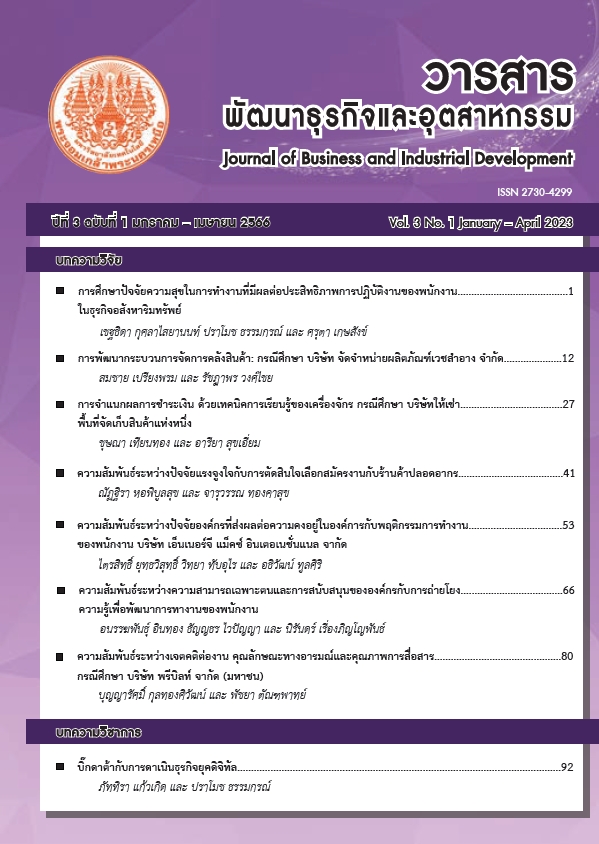The Relationship between Perceived Self-Efficacy, Organizational Support and Knowledge Transferring to Improve Employees’ Work in a Bank Company
Keywords:
Self-Efficacy, Ability to Work, Organizational Support, Knowledge TransferringAbstract
The objectives of this research were to study 1) employees’ perceived self-efficacy in working, organizational support and knowledge transferred to improve employees’ work, 2) the relationship between perceived self-efficacy, organizational support and knowledge transferred to improve employees’ work. The participants were employees working at Krung Thai Bank PCL., head quarter. The research tool was a questionnaire. The data were analyzed by statistics of frequency, percentage, mean, standard deviation, t-test, f-test and Pearson Product Moment Correlation Coefficient. The results revealed that Employees’ perceived self-efficacy in working was at a high level, arranged as follows: 1) able to use computer, 2) confidence in searching organization, 3) perceived self-ability. Organizational support was at a high level, arranged as follows: 1) organizational relationship, 2) management of the technology system for knowledge transferring, 3) model enhancing the learning. The Knowledge transferred to improve employees’ work was at a high level, arranged as follows: 1) knowledge and information in the knowledge management system enable to improve work performance, 2) enable to receive important organizational information, 3) able to work accurately and fast by using knowledge management system. The result found that the relationship between perceived self-efficacy, organizational support and knowledge transferred to improve employees’ work were related at an average level and at a high level, respectively, in the same direction with statistical significance at the 0.05 level.
References
Joshi, K., & Knowledge, S. (2007). Transfer within Information Systems Development Teams: Examining the Role of Knowledge Source Attributes. Decision Support Systems, 43, 322–335.
Haslell, R. E. (2001). Transfer of Learning: Cognition, Instruction and Reasoning. UK.: Academic Press.
Krung Thai Bank. (2014, 11 September). Krung Thai Bank Public Company Limited. www.intranet.ktb (in Thai).
Lmarinen, J., Tuomi, K., & Seiitsamo, J. (2005). New Dimension of Work Ability. International Congress Series, 1280. 3-7.
Bandura, A., Freeman, W.H., Lightsey, R. (1999). A Self-Efficacy: The Exercise of Control. New York: WH. Freeman and Company.
Teerapisakkul, S. (2011). Factors Leading to the Use of Knowledge Management Systems: A Case Study of Software Development Organizations. [Unpublished master’s thesis]. Thammasat University. (in Thai).
Mcshane, S.L., & Von, G. Marry MA. (2003). Organization Behavior: Emerging Realities for the Workplace Revolution (2nd ed.). McGraw-Hill Inc.
Berry, J.M. (1987). A Self-Efficacy Model of Memory Performance. American Psychological Association Meetings. New York.
Iamsupasit, S. (2007). Behavior Modification Theory and Techniques (10th ed.). Bangkok: Chulalongkorn University. (in Thai).
Perkins, D.N., & Solomon, G. (1988). Teaching for Transfer. Educational Leadership.
Haslell, Robert E. (2001). Transfer of learning: Cognition, instruction and Reasoning. UK: Academic Press.
Pengthieng, W. (2010). Factors Affecting Knowledge Management Process of Master’s Degree Students, Special Program, Faculty of Management Science. [Unpublished master’s thesis]. Naresuan University. (in Thai).
Duangchampa, W. (2011). Factors of Participatory Management Affecting Knowledge Management in Private Educational Institutions in Chachoengsao. [Unpublished master’s thesis]. Rajabhat Rajanagarindra University. (in Thai).
Royal Academy. (1987). Royal Institute Dictionary 1982. (7thed.). Bangkok: Royal Institute. (in Thai).
Thaposot, S. (2013). Perceived Organizational Support Affecting Job Performance of Employees in Banking Business. [Unpublished master’s thesis]. Rajamangala University of Technology Thanyaburi. (in Thai)
Tierney, P., & Farmer S.M. (2002). Creative Self-Efficacy: Its Potential Antecedents and Relationship to Creative Performance. The Academy of Management Journey. 45(6), 1137-1148.
Wirojcharoenwong, W., Rattanasiriwongwut, M., & Tiantong, M. (2013). The Relationship between Personal SurroundingsandSelf-Efficacy When Using a Computer. Journal of Science and Technology, 21(6), 565-577. (in Thai).
Woowongse, T. (2009). Knowledge System Motivation Factors : Case Study Advanced Info Service Public Company Limited. Thammasat University. (in Thai).
Downloads
Published
How to Cite
Issue
Section
License

This work is licensed under a Creative Commons Attribution-NonCommercial-NoDerivatives 4.0 International License.





